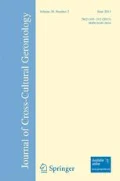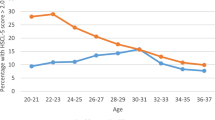Abstract
The goal of this research is to examine if the long neglected correlates such as social and leisure activities, social support, and subjective social status contribute to variations in psychological distress among older Chinese. Using data collected in one of the most developed areas in China—Suzhou city, Jiangsu province, the authors find that engaging in various exercises, living with both spouse and adult children, perceived availability of social support from others as well as believing in the importance of caring for other family members are particularly beneficial for mental health whereas the perception of relative deprivation and low life quality is detrimental to mental health for older Chinese. This work is among the first studies that comprehensively examined various important correlates of psychological distress and indicate the unique patterns of distress among the elderly in the most developed area in the contemporary China.

Similar content being viewed by others
References
Adams, K. B., Leibbrandt, S., & Moon, H. (2011). A critical review of the literature on social and leisure activity and wellbeing in later life. Ageing and Society, 31, 683–712.
Barrera, M. J. (1986). Distinctions between social support concepts, measures, and models. American Journal of Community Psychology, 14, 413–445.
Brown, S. L., Nesse, R. M., Vinokur, A. D., & Smith, D. M. (2003). Providing social support may be more beneficial than receiving it: results from a prospective study of mortality. Psychological Science, 14, 320–327.
Brown, W. M., Consedine, N. S., & Magai, C. (2005). Altruism relates to health in an ethnically diverse sample of older adults. The Journal of Gerontology: Psychological Sciences, 60B, 143–P152.
Chen, R.-L., Hu, Z., Qin, X., Xu, X.-C., & Copeland, J. R. M. (2004). A community-based study of depression in older people in Hefei, China—the GMS-AGECAT prevalence, case validation and socio-economic correlates. International Journal of Geriatric Psychiatry, 19, 407–413.
Chen, L.-J., Stevinson, C., Ku, P.-W., Chang, Y.-K., & Chu, D.-C. (2012). Relationships of leisure-time and non-leisure-time physical activity with depressive symptoms: a population-based study of Taiwanese older adults. International Journal of Behavioral Nutrition and Physical Activity, 9, 28. doi:10.1186/1479-5868-9-28.
Cheng, S.-T., & Chan, A. C. M. (2006). Filial piety and psychological well-being in well older Chinese. The Journals of Gerontology: Psychological Sciences, 61B, 262–P269.
Chiao, C., Weng, L. J., & Botticello, A. L. (2011). Social participation reduces depressive symptoms among older adults: An 18-year longitudinal analysis in Taiwan. BMC Public Health, 11, 292. doi:10.1186/1471-2458-11-292.
Chou, K.-L., Ho, A. H. Y., & Chi, I. (2006). Living alone and depression in Chinese older adults. Ageing & Mental Health, 10, 583–591.
Coleman, D. (1993). Leisure based social support, leisure dispositions and health. Journal of Leisure Research, 25, 350–361.
Collins, A. L., & Goldman, N. (2008). Perceived social position and health in older adults in Taiwan. Social Science & Medicine, 66, 536–544.
Demakakos, P., Nazroo, J., Breeze, E., & Marmot, M. (2008). Socioeconomic status and health: the role of subjective social status. Social Science & Medicine, 67, 330–340.
Eibner, C., & Evans, W. N. (2005). Relative deprivation, poor health habits and mortality. Journal of Human Resources, 40, 591–562.
Ellison, C. G., & George, L. K. (1994). Religious involvement, social ties, and social support in a southeastern community. Journal for the Scientific Study of Religion, 33, 46–61.
Ellison, C. G., & Levin, J. S. (1998). The religion-health connection: evidence, theory, and future directions. Health Education and Behavior, 25, 700–720.
Glass, T. A., Mendes de Leon, C., Marottoli, R. A., & Berkman, L. F. (1999). Population based study of social and productive activities as predictors of survival among elderly Americans. British Medical Journal, 319, 478–483.
Glass, T. A., Mendes de Leon, C. F., Bassuk, S. S., & Berkman, L. F. (2006). Social engagement and depressive symptoms in late life. Journal of Aging and Health, 18, 604–628.
Gong, F., Xu, J., & Takeuchi, D. T. (2012). Beyond conventional socioeconomic status: examining subjective and objective social status with self-rated health among Asian immigrants. Journal of Behavioral Medicine, 35, 407–419.
House, J. S., Landis, K. R., & Umberson, D. (1988). Social relationships and health. Science, 241, 540–545.
Hu, P.-F., Alder, N. E., Goldman, N., Weinstein, M., & Seeman, T. E. (2005). Relationship between subjective social status and measures of health in older Taiwanese persons. Journal of the American Geriatrics Society, 53, 483–488.
Huang, Y. (2012). Family relations and life satisfaction of older people: a comparative study between two different hukous in China. Ageing & Society, 32, 19–40.
Koenig, H. G., McCullough, M. E., & Larson, D. B. (2001). Handbook of religion and health. New York: Oxford University Press.
Krause, N. (2003). Religious meaning and subjective well-being in late life. The Journals of Gerontology: Psychological Sciences, 58, S160–S170.
Krause, N., Liang, J., & Gu, S.-Z. (1998). Financial strain, received support, anticipated support, and depressive symptoms in the people’s republic of China. Psychology and Aging, 13, 58–68.
Ku, P.-W., Stevinson, C., & Chen, L.-J. (2012). Prospective association between leisure-time physical activity and cognitive performance among older adults across an 11-year period. Journal of Epidemiology, 22, 230–237.
Lampinen, P., Heikkinen, R. L., Kauppinen, M., & Heikkinen, E. (2006). Activity as a predictor of mental well-being among older adults. Aging & Mental Health, 10, 454–466.
Leu, J.-X., Yen, I. H., Gansky, S. A., Walton, E., Adler, N. E., & Takeuchi, D. T. (2008). The association between subjective social status and mental health among Asian immigrants: investigating the influence of age at immigration. Social Science & Medicine, 66, 1152–1164.
Leung, K.-K., Chen, C.-Y., Lue, B.-H., & Hsu, S.-T. (2007). Social support and family functioning on psychological symptoms in elderly Chinese. Archives of Gerontology and Geriatrics, 44, 203–213.
Li, L. W., & Liang, J. (2007). Social exchanges and subjective well-being among older Chinese: does age make a difference? Psychology and Aging, 22, 386–391.
Li, N., Pang, L.-H., Chen, G., Song, X.-M., Zhang, J., & Zheng, X.-Y. (2011). Risk factors for depression in older adults in Beijing. Canadian Journal of Psychiatry, 56, 466–473.
Li, Y.-M., Chen, C.-S., Tu, H.-B., Cao, W.-J., Fan, S.-H., Mao, Y., Xu, Y.-Y., & Hua, Q.-Z. (2012). Prevalence and risk factors for depression in older people in Xi’an China: a community-based study. International Journal of Geriatric Psychiatry, 27, 31–39.
Liang, J., Gu, S.-Z., & Krause, N. (1992). Social support among the aged in Wuhan, China. Asia-Pacific Population Journal, 7, 33–62.
Liang, J., Krause, N. M., & Bennett, J. M. (2001). Social exchange and well-being: is giving better than receiving. Psychology and Aging, 16, 511–523.
Lim, L. L., Chang, W.-N., Yu, X., Chiu, H., Chong, M.-Y., & Kua, E.-H. (2011). Depression in Chinese elderly populations. Asian-Pacific Psychiatry, 3, 46–53.
Mangyo, E., & Park, A. (2011). Relative deprivation and health. The Journal of Human Resources, 46, 459–481.
Merton, R. K. (1968). Social theory and social structure. New York: Free Press.
Mirowsky, J., & Ross, C. E. (2003). Social courses of psychological distress (2nd ed.). New York: Aldine de Gruyter.
Operario, D., Adler, N. E., & Williams, D. R. (2004). Subjective social status: reliability and predictive utility for global health. Psychology and Health, 19, 237–246.
Poulin, M. J., Brown, S. L., Ubel, P. A., Smith, D. M., Jankovic, A., & Langa, K. M. (2010). Does a helping hand mean a heavy heart? helping behavior and well-being among spouse caregivers. Psychology and Aging, 25, 108–117.
Ross, C. E., & Zhang, W. (2008). Education and psychological distress among older Chinese. Journal of Aging and Health, 20, 273–289.
Rowe, J. W., & Kahn, R. L. (1997). Successful aging. The Gerontologist, 37, 433–440.
Sakurai, K., Kawakami, N., Yamaoka, K., Ishikawa, H., & Hashimoto, H. (2010). The impact of subjective and objective social status on psychological distress among men and women in Japan. Social Science & Medicine, 70, 1832–1839.
Singh-Manoux, A., Adler, N. E., & Marmot, M. G. (2003). Subjective social status: its determinants and its association with measures of ill-health in the Whitehall II study. Social Science & Medicine, 56, 1321–1333.
Subramanyam, M., Kawachi, I., Berkman, L., & Subramanian, S. V. (2009). Relative deprivation in income and self-rated health in the United States. Social Science & Medicine, 69, 327–334.
Sun, R., & Liu, Y. (2006). Mortality of the oldest old in China: The role of social and solitary customary activities. Journal of Aging and Health, 18, 37–55.
Sun, X.-J., Lucas, H., Meng, Q.-Y., & Zhang, Y.-G. (2011). Associations between living arrangements and health-related quality of life of urban elderly people: a study from China. Quality of Life Research: An International Journal of Quality of Life Aspects of Treatment, Care and Rehabilitation, 20, 359–369.
Walsh, R. (2011). Lifestyle and mental health. American Psychologist, 66, 579–592.
Wilkinson, R. G., & Pickett, K. E. (2006). Income inequality and population health: a review and explanation of the evidence. Social Science & Medicine, 62, 1768–1784.
Wu, Z., & Schimmele, C. M. (2006). Psychological disposition and self-reported health among the ‘oldest-old’ in China. Ageing and Society, 26, 135–151.
Yu, J., Li, J., Cuijpers, P., Wu, S.-T., & Wu, Z.-Y. (2012). Prevalence and correlates of depressive symptoms in Chinese older adults: a population-based study. International Journal of Geriatric Psychiatry, 27, 305–312.
Zeng, Y., Gu, D.-N., & George, L. K. (2011). Association of religious participation with mortality among Chinese old adults. Research on Aging, 33, 51–83.
Zhang, W. (2008). Religious participation and mortality risk among the oldest old in China. The Journals of Gerontology: Social Sciences, 63B, S293–S297.
Zhang, W., & Liu, G. (2007). Childlessness, psychological well-being, and life satisfaction among the elderly in China. Journal of Cross-Cultural Gerontology, 22, 185–203.
Author information
Authors and Affiliations
Corresponding author
Rights and permissions
About this article
Cite this article
Zhang, W., Chen, M. Psychological Distress of Older Chinese: Exploring the Roles of Activities, Social Support, and Subjective Social Status. J Cross Cult Gerontol 29, 37–51 (2014). https://doi.org/10.1007/s10823-013-9219-0
Published:
Issue Date:
DOI: https://doi.org/10.1007/s10823-013-9219-0




